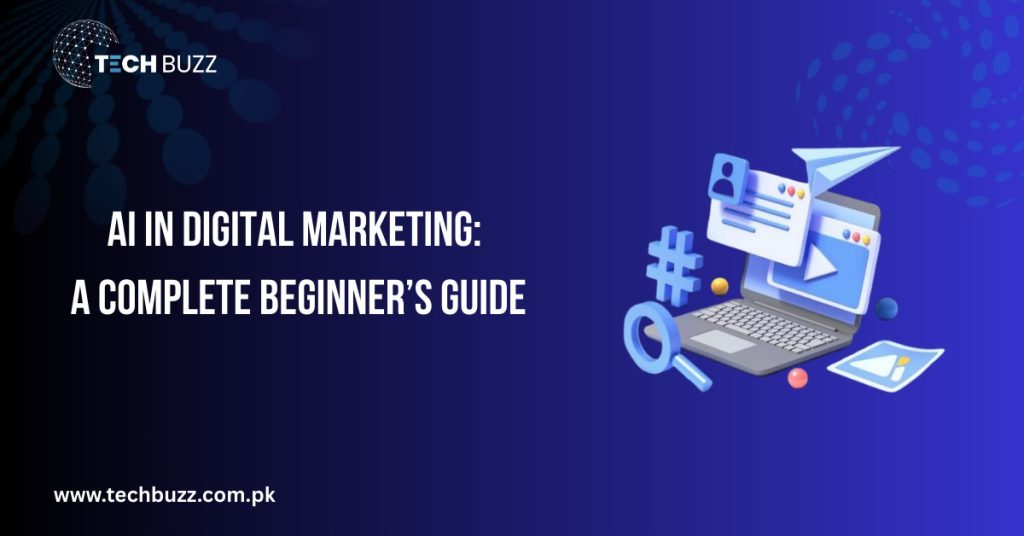Digital marketing has always been about reaching the right people, at the right time, with the right message. But in 2025, things are changing faster than ever. The reason? AI in digital marketing. From big brands to small businesses, everyone is now exploring how artificial intelligence can help them grow. But is AI just hype, or is it truly the future of marketing? And how can beginners like you start using it effectively?
This guide will answer those questions step by step. It will explain everything in simple words, give practical tips, and show you how agencies like Techbuzz use AI to deliver results. By the end, you’ll know why AI in digital marketing matters and how you can benefit from it today.
________________________________________________
How to Use AI in Digital Marketing: A Step-by-Step Guide for Beginners
Future of AI | AI Automation | What is AI?
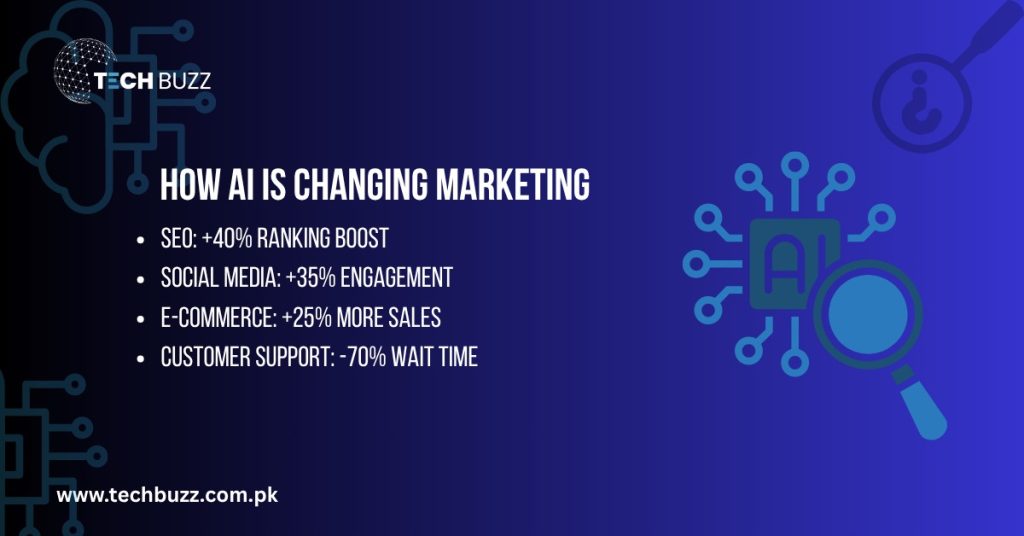
Artificial intelligence in digital marketing is not just a buzzword; it’s already changing the industry. Businesses are investing in AI because it helps them:
- Understand customers better.
- Save time by automating routine tasks.
- Deliver more personalized experiences.
- Predict what customers might do next.
For example, when you browse an online store and see product recommendations that match your taste, that’s AI at work. Or when you ask a website question and get an instant reply from a chatbot, again, that’s AI.
With tools like AI search engines, AI software, and AI automation, brands can serve customers more efficiently and effectively. And since consumers expect quick responses and tailored solutions, companies that use AI stand out from the rest.
So yes, the hype is real. And if you want to succeed in the future of digital marketing, learning what AI is in digital marketing is no longer optional—it’s necessary.
How to Use AI to Get Ahead in 2025?
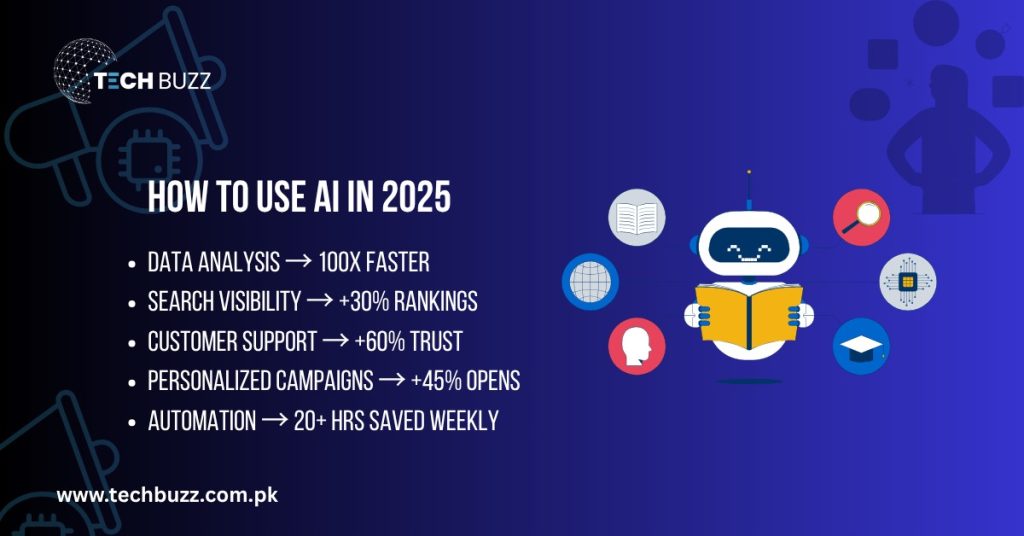
The year 2025 will be a turning point for marketing. Competition will increase, and customers will demand even more personalized services. The good news? AI gives you the tools to stay ahead.
Here’s how you can use it to gain an edge:
1. Smarter Data Analysis
AI can process large amounts of data faster than humans. With AI software, you can track user behavior, buying patterns, and even predict future actions. This means you’ll know exactly what your audience wants before they do.
2. Better Search Visibility
Ranking on Google is tough. But with AI in SEO and AI search engine optimization, you can optimize your content smarter. AI tools show you which keywords matter, what users are asking, and how to structure your content to rank higher.
3. Instant Customer Support
Consumers hate waiting. Adding an AI chatbot to your website gives instant replies, answers FAQs, and solves problems 24/7. This builds trust and keeps customers happy.
4. Personalized Campaigns
Emails that sound generic often end up in spam. With AI for email marketing, you can send messages based on user preferences, behavior, and timing. Personalized emails mean more clicks, more sales, and stronger customer relationships.
5. Smarter Marketing Automation
AI saves you time. From scheduling posts to analyzing campaigns, AI automation handles repetitive tasks. This allows you to focus on strategy and creativity.
So, if you want to stay ahead in 2025, combine your creativity with the power of AI tools. That’s how smart marketers are winning today.
5 Tips to Design an AI Digital Marketing Strategy
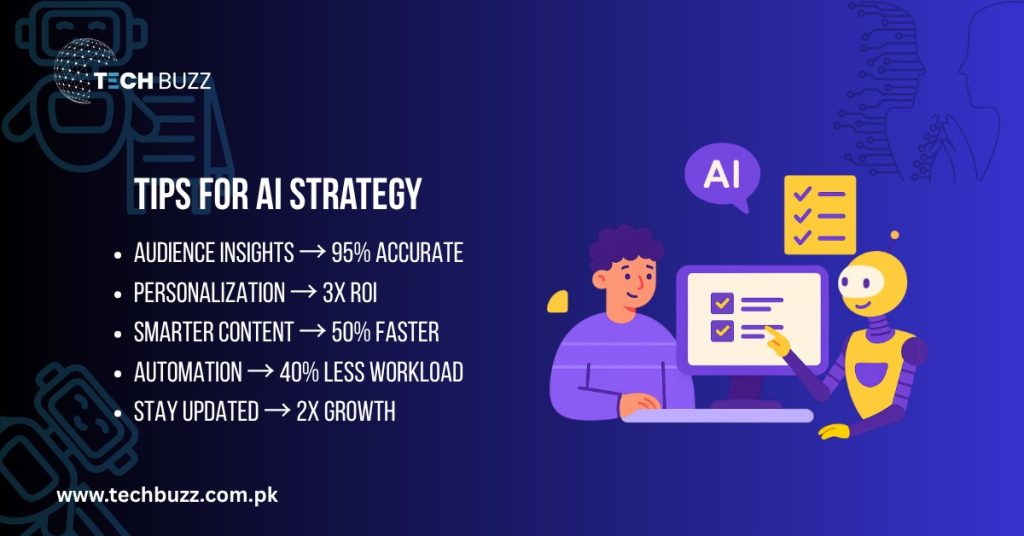
Having tools is one thing, but knowing how to use them in a digital marketing strategy is what truly drives success. Many businesses already invest in AI tools but fail to apply them strategically. A well-planned approach ensures that you not only save time but also improve customer experience, increase sales, and stay ahead of competitors. Below are seven powerful tips to design an AI-driven digital marketing strategy that works in today’s fast-changing business environment.
1. Start With Your Audience
Every great strategy begins with a clear understanding of your audience. Without knowing who you are targeting, even the best AI tools will not deliver results. Use AI in digital marketing to collect and analyze search data, customer behavior, and online buying patterns.
For example, if you discover through AI insights that most of your customers spend more time on Instagram rather than Facebook, you can use AI in social media marketing to schedule posts, run ads at the right times, and reach the most active users. Similarly, AI-powered tools can segment your audience into groups—such as new visitors, repeat buyers, or abandoned cart users—and help you design different strategies for each group.
When you know your audience, your marketing becomes less about guessing and more about targeting the right people at the right time.
2. Make Personalization a Priority
Today’s customers expect more than just generic ads or emails—they want brands to speak directly to their interests and needs. That’s why personalization is one of the strongest benefits of AI in digital marketing.
For instance, in AI in e-commerce, tools can recommend products based on browsing history or previous purchases. This is the same technology that platforms like Amazon and Netflix use to keep users engaged. Similarly, AI tools for marketing can personalize ad copy, email subject lines, and even website content for different customer groups.
This level of personalization helps you build stronger relationships, boost conversions, and create brand loyalty. When customers feel that your business understands them, they are far more likely to come back again.
3. Create Smarter Content With AI
Content remains at the heart of digital marketing. From blogs and videos to product descriptions and social media updates, businesses need a constant flow of content to stay visible. However, creating quality content can be time-consuming.
This is where AI in content creation comes in. Tools for AI generated content can draft blogs, ad copies, and social posts within minutes. They can also suggest keywords, trending topics, and the best formats for different platforms. For example, AI can help you design engaging captions for Instagram, product descriptions for e-commerce stores, or even personalized email campaigns.
That said, it is important to remember that AI should not completely replace humans in content marketing. While AI can create structured, data-driven content quickly, only humans can add emotions, storytelling, and creativity that truly connect with people. The best strategy is to use AI to handle the heavy lifting and then refine the content with a human touch.
4. Automate to Save Time
Repetitive tasks take away valuable time from your marketing team. With AI marketing tools, you can automate many of these tasks and free up time for creativity and innovation.
For example, AI can automatically generate performance reports, track customer responses, or nurture leads through email automation. Chatbots powered by AI can also provide 24/7 support to answer customer questions instantly, reducing the workload for human agents.
By using automation, you not only save time but also reduce errors and improve efficiency. This allows your team to focus on what matters most—developing ideas and strategies that machines cannot replace.
5. Stay Updated With AI Trends
The world of AI changes very quickly. What works today may not deliver results tomorrow. That’s why businesses need to stay informed about new AI updates, features, and innovations in digital marketing.
Brands that adopt new tools early often gain a competitive edge. For example, companies that started using AI for personalization years ago now enjoy higher conversion rates compared to those still relying on traditional marketing. Similarly, new AI-powered video editing tools, voice search optimization features, and predictive analytics can completely transform your strategy if adopted early.
To stay ahead, keep learning through webinars, industry blogs, and AI tool updates. The more you stay aware, the faster you can adapt.
6. Select the Best AI Tools
Not all AI tools are created equal, and choosing the wrong ones can waste time and money. When selecting AI marketing tools, focus on your business needs. Do you need better content creation? Look for AI in content creation platforms. Do you want improved e-commerce recommendations? Choose specialized AI in e-commerce tools.
Some popular options include tools for predictive analytics, automated ad management, AI chatbots, and content writing assistants. The right combination of tools will help you design a strategy that is both efficient and scalable.
7. Measure Performance Regularly
No matter how strong your AI digital marketing strategy is, it must be tested and measured. Use analytics to track which campaigns are working and which are not.
For instance, AI can show you how customers interact with your emails, ads, or landing pages. It can also measure ROI, track engagement rates, and predict future customer behavior. By measuring performance, you can refine your approach and ensure that your AI in your digital marketing strategy continues to deliver long-term results.
What Are the Pros & Cons of AI Digital Marketing?
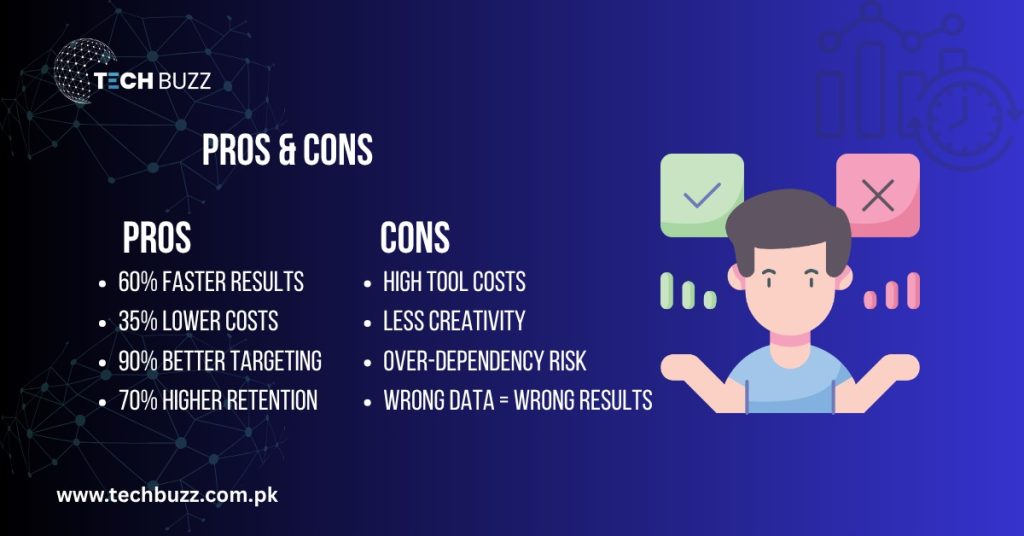
Like everything, AI has two sides. Let’s look at both.
Pros of AI
- Faster Results: AI cuts down manual work and speeds up campaigns.
- Better Targeting: It knows exactly who to reach and when.
- Cost Saving: With AI automation, small teams can do the work of big teams.
- Improved Service: Tools like an AI chatbot provide instant help.
- Smarter SEO: AI in SEO improves ranking accuracy.
- Personalization: With AI for email marketing, users feel more connected to your brand.
Cons of AI
- High Costs: Some advanced AI tools can be expensive.
- Less Creativity: AI-generated content often misses human emotions.
- Dependency: Relying too much on automation can limit innovation.
- Data Issues: Wrong data can lead to wrong results.
What Are the Most Common Skills Used in AI-Driven Digital Marketing?
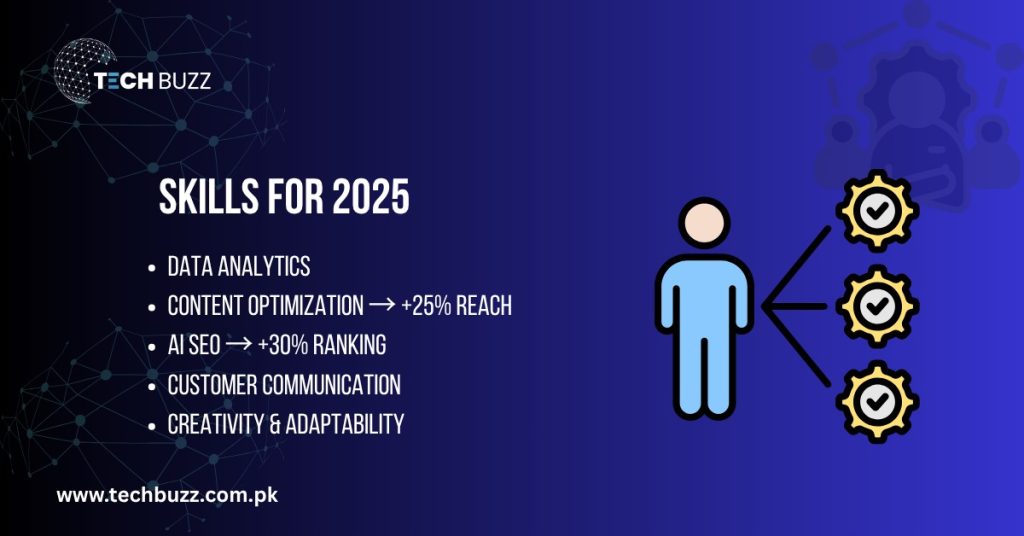
If you want to grow in this field, developing the right AI skills is crucial. Here are the top ones in demand:
- Data Analytics: Reading and understanding reports from AI software.
- Content Optimization: Using AI in content marketing tools to improve blogs, posts, and ads.
- SEO Skills: Leveraging AI in SEO for ranking higher on search engines.
- Communication: Managing customer chats using AI chatbot technology.
- Creativity + Adaptability: Knowing how AI is changing marketing and adapting quickly.
How Techbuzz Professionals Are Using AI for Digital Marketing and Making Our Agency the Best Choice for These Services?
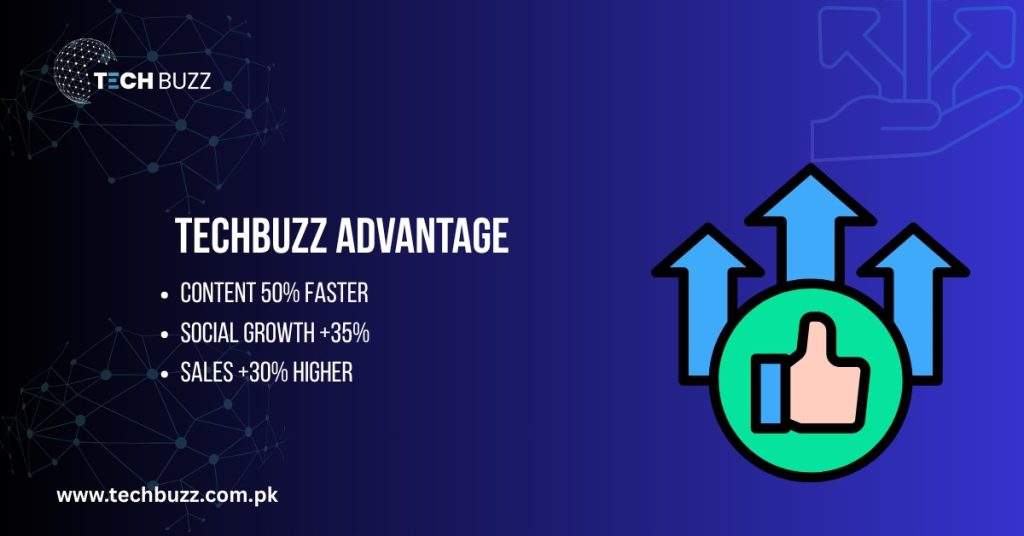
At Techbuzz, we don’t just follow trends; we create results. Our team uses AI marketing tools daily to deliver powerful campaigns. Here’s how:
- Content That Engages: With AI in content creation, we produce blogs, ads, and posts quickly, then polish them with human creativity.
- Social Media Growth: We use AI in social media analytics to know when and where to post for maximum impact.
- Sales Boost in E-commerce: With AI in e-commerce, we help businesses show the right products at the right time. This leads to more conversions.
- Automation That Saves Time: From scheduling reports, AI automation frees us to focus on strategies that matter.
Conclusion: Why AI in Digital Marketing Matters Today
To wrap it up, AI in digital marketing is no longer just hype—it’s reality. It’s helping businesses connect, engage, and sell like never before. From AI-generated content to AI in ecommerce, from AI in SEO to AI for email marketing, the opportunities are endless.
Of course, the cons of AI remind us that it’s not perfect. But when used wisely, the pros of AI far outweigh the challenges. The smart move is to combine human creativity with AI power.
The future of digital marketing belongs to those who adapt early. So if you want to grow in 2025 and beyond, start exploring AI tools, learn the needed AI skills, and take advantage of this technology today.
And remember, Techbuzz is here to guide you every step of the way. Together, we can shape a smarter and more successful future with AI. Contact us for a guide.
If you want more information about our work, you can read our blogs.
What is AI?
AI, or Artificial Intelligence, is the ability of machines to think and learn like humans. From simple AI search tools to advanced AI software, it helps businesses work smarter.
What is AI in digital marketing?
It means using artificial intelligence to make marketing better. From AI search engine optimization to AI in content marketing, it helps businesses reach the right people in smarter ways.
How is AI changing marketing today?
It’s changing everything. AI in SEO improves rankings, AI in social media boosts engagement, and AI in e-commerce increases sales. These AI trends are transforming marketing completely.
What is the future of AI in marketing?
The future is very bright. With advanced AI tools for marketing, businesses can personalize at scale, save money, and grow faster. The future of AI will continue shaping the future of digital marketing.

